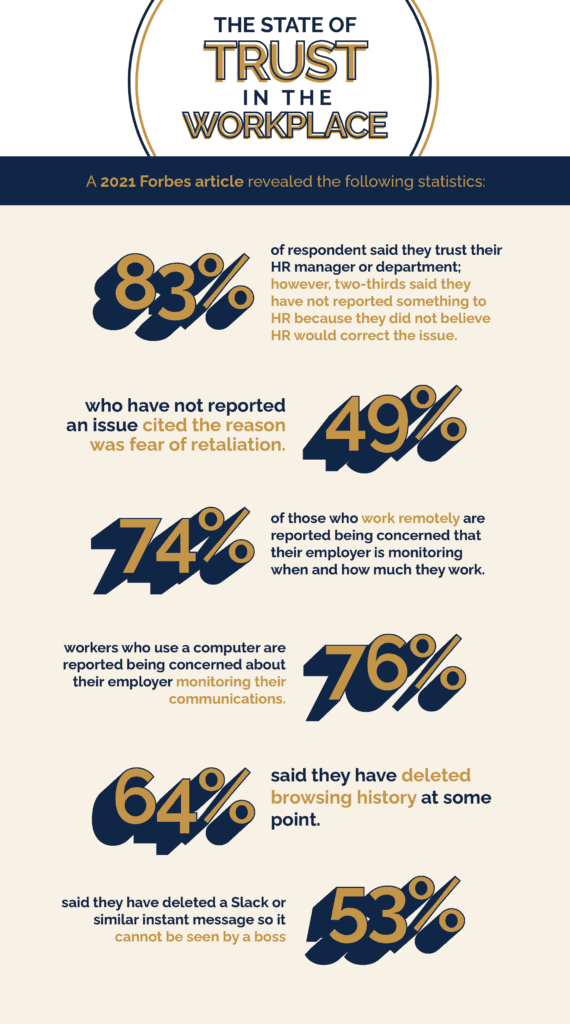Trust is Key in Recession Proofing Your Business
What do Google, Amazon, Walmart, Microsoft, Spotify, Netflix, Ford, Tesla, Twitter, Meta, Peloton, Coinbase, CVS, Uber, Carvana, Robinhood, Nestle, QVC, Zillow, Expedia, and Game Stop all have in common? They, among many other companies, have gone through at least one round of layoffs or a hiring slowdown or freeze in the past 12 months. These are iconic brands. Giants in their space, with many having reportedly great company cultures. This gave them the edge, allowed them to have their pick of talented job seekers in this tight and turbulent talent market, and, ultimately, over hire.
Insecurities Are On The Rise
In sharp contrast to previously reported sentiment, and considering the looming recession, U.S. workers are starting to feel less secure in their jobs. Employees feeling secure at work and in their jobs is table stakes for retention, and unlike the companies who were flush with talented people flocking to work for them, most companies are still struggling to attract and retain enough workers to meet demand.
Article after article highlights employees leaving their jobs in pursuit of work that fulfils them and provides the flexibility they crave. However, feelings of insecurity is bubbling up in recent reports as a new factor spurring workers to seek new jobs. According to a Pew Research Center report, 45% of workers who do not feel secure in their jobs indicated that they will be seeking a new one. In contrast, only 14% of people who reported feeling secure in their current position reported the same.
Feelings of insecurity are rooted in a lack of trust in the organization. A 2021 Forbes article revealed the following statistics on the state of trust in the workplace.

- 83% of respondent said they trust their HR manager or department; however, two-thirds said they have not reported something to HR because they did not believe HR would correct the issue.
- 49% who have not reported an issue cited the reason was fear of retaliation.
- 74% of those who work remotely are reported being concerned that their employer is monitoring when and how much they work.
- 76% of workers who use a computer are reported being concerned about their employer monitoring their communications.
- 64% said they have deleted browsing history at some point.
- 53% said they have deleted a Slack or similar instant message so it cannot be seen by a boss
The street goes both ways. Employees want to trust their employer and to feel trusted. Employers signal trust in their employees when they give them the freedom and responsibility to manage their own work, as well as to make decisions that affect them. With 74% of employees being concerned that their employer is checking up on them when they work and 76% being concerned that their computers are being monitored, it does not appear that employees feel trusted or trust their managers or companies.
Cash Rules Everything Around Me
We know that money matters. If an employee does not feel that they are being fairly compensated, they will go elsewhere for more money and the truth is that they will most likely get a pay raise. The data shows that 60% of workers who changed companies between April 2021 and March 2022 saw a wage increase of around 9.7%, whereas those who did not change employers, saw a loss of 1.7%. The same Pew Research Center report cited the second reason workers are looking outside of their current company for a new job is, indeed, money. Only 15% of workers who feel their financial situation is good or excellent reported seeking a new job, whereas 29% of those who feel their financial situation is poor reported looking.

If employees are effectively taking pay cuts to stay in their current jobs and they see that people all around them are getting job offers for more money, why wouldn’t they throw their hat in the ring and do the same? The currently tight talent market is driving up the price to acquire talent and companies are responding by throwing money at the problem, creating a vicious cycle.
Culture Eats Strategy for Breakfast
As I mentioned in my May 2022 article, good pay and benefits have to be there in order for employees to feel motivated to work and perform well, but it is not enough alone to keep internal talent from leaving. The Great Regret is proving this to be true. A recent Forbes article reported that 72% of Muse survey respondents reported disappointment in their new job because it was misrepresented by the employer during the interview process. An earlier Harvard Business Review article cited that 30% of new employees leave the new job within 90-days, with 46% saying the role did not meet their expectations, 34% saying there was a specific incident that caused them to leave, and 32% saying it was the company’s culture that sent them running for the door again.
To recession proof your business, you must meet productivity goals and without the right, motivated employees, you can’t. Companies need to be intentional about their culture and part of that culture must include mutual trust. Take an inventory of how the company is meeting employee needs and what needs are not being met. If employees see that company leaders are invested in building a culture that meets employee needs and is taking positive action, this will begin to build trust and they will be more patient than you might think. Here are a few tips to begin being intentional about building a company culture where there is mutual trust and employees are motivated to perform at their best because their needs are being met.

- Communication – To ease feelings of insecurity a company must be intentional about building trust. One of the key ways to do so is through authentic and transparent communication at all levels. Like in any relationship, communication is king. And silence feels like secrecy. Even if the news isn’t good, employees feeling in-the-know will help to build trust.
- Alignment – Trust employees to be stewards of the business strategy. Share the company’s strategic direction and plans. If employees don’t know where the company is headed, they cannot align with the vision. This helps employees see the value in their jobs, find meaning in their work, and be successful in their roles.
- Accountability – Provide clear direction on expectations, hold people accountable for meeting those expectations and ensure that employees have what they need to meet these expectations. Leaders need to provide resources necessary to succeed and then trust employees to do so. Leaders also need to hold each other accountable in the same way, otherwise, it is do as I say, not as I do.
- Growth and Development – Give all employees, not just your high performers or those on succession charts, the opportunity to learn and grow. Then promote from within. Investing in growing your internal talent sends the message that the company values them, recognizes the good work they are currently doing, and trusts them to meet their full potential.
A lack of trust in a company’s culture leaves room for doubt and doubt is the enemy of top performance. If your employees feel insecure, are not motivated to perform at their best, or looking for the escape hatch, the company cannot expect to meet its productivity and performance goals. As the economy moves closer to a recession, companies that want to do their best to survive need to look deeper into the root causes of low productivity and employee turnover.

PSP Metrics has been at the forefront of science-backed employee assessments and measurement systems for over 75 years. Our mission has always been to help give you a competitive business advantage through your company’s most valuable resource — your people.

Dr. Nicole Scott
Dr. Nicole C. Scott is a Principal Psychologist at PSP Metrics. Her expertise is in talent gap analysis and development, individual performance development, team development, employee engagement, DEI, and coaching (individual, team, and group), with a deep expertise in job evaluation, competency modeling, succession planning, and both high potential mid-level leader development and frontline worker career development programs. Dr. Scott can be contacted at: nscott@pspmetrics.com or via LinkedIn.
Comments are closed.

